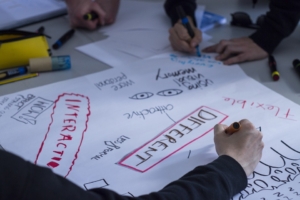Defining Your Culture and Hiring Strategically
By Patty Crabtree
Picture in your mind a race car speeding toward that waving checkered flag as it prepares to cross the finish line. If you think of a company like a high-performance car, culture is the oil that allows everything to run smoothly to help achieve your goals.
 Culture reflects what is greatest, genuine, and noble about the company. It is the key behaviors an organization expects as the team works together and with its clients and vendors.
Culture reflects what is greatest, genuine, and noble about the company. It is the key behaviors an organization expects as the team works together and with its clients and vendors.
Culture establishes the foundation of the company and defines the qualities to be successful and help achieve its mission.
Overcoming A Culture Challenge
The culture journey for Bill’s company started with identifying the key attributes that they felt exemplified how they wanted to work together. Bill communicated it to staff and shared it with his clients. He posted it on the breakroom wall as a reminder. The company even branded it in their email signature blocks.
But the challenge was their behaviors did not reflect those defined values. It was not the heart of the organization. The words chosen were what they seen other successful companies using to define their values. It just was not who they were, how they were making their decisions and how leadership was supporting staff.
This misalignment led to a high turnover rate. A turnover rate that cost not only the hard dollars and time to recruit new candidates, but the soft dollar costs of repeated onboarding and staff scrambling to cover all the work. The situation had an adverse impact on company morale. Overall, the company had stalled in its growth.
Bill and his leadership team were puzzled. They felt they had a good work environment and didn’t understand what was holding them back. They were committed to creating an environment for growth and decided to take a step back to reassess their approach.
Bill’s team went through an exercise to help them identify the genuine culture for their firm. What were the core values that would drive their business, their team? Through this effort, they uncovered their own unique style and reflected it in their values.
 Then, they took it one step further. Each value was clearly defined to communicate what it meant to the organization. Definition statements were created for each value to describe its intent. These enhanced values were shared with staff and communicated on a regular basis. Leadership reinforced them in their daily interactions.
Then, they took it one step further. Each value was clearly defined to communicate what it meant to the organization. Definition statements were created for each value to describe its intent. These enhanced values were shared with staff and communicated on a regular basis. Leadership reinforced them in their daily interactions.
The updated values were also more deeply embedded into their recruiting process. Behavioral interview questions were developed that focused on cultural fit which helped pinpoint the best candidates.
Over time, Bill’s company’s turnover was reduced by more than 50%. The recruitment process brought the right people to the team. Bill and his leadership team were successfully enhancing their infrastructure and teamwork which drove the growth.
Nurturing the culture and creating a stronger recruiting strategy took a focused effort to produce the desired results. In the long run, it paid dividends for them. Year after year they exceeded their goals and built a well-oiled machine.
Strong Culture Creates The Power of Alignment
One of the most powerful tools is alignment. Alignment brings a shared vision with everyone moving in the same direction.
Every company has culture whether it is by accident or by design. Some may be in that early growth stage and have been chasing the business opportunities, so culture has not been formally developed. Others may have determined their values but the day to day takes over and it isn’t nurtured.
 If your company is being outperformed in the marketplace, you experience high turnover in key positions, financial performance is declining, or just want to move from good to great, often these issues are a result of an unhealthy culture.
If your company is being outperformed in the marketplace, you experience high turnover in key positions, financial performance is declining, or just want to move from good to great, often these issues are a result of an unhealthy culture.
Alignment empowers your staff with the knowledge of what to do, how to do it and why it is being done. It gives an emotional stability to their work world that encourages high performance.
Be Purposeful With Your Culture
Developing that path toward alignment is one part of the process. Being purposeful with it is another aspect. Leadership must walk the walk. If this does not happen, then your culture will struggle.
Once you have defined your culture and it has been effectively communicated to staff, a critical part of the process comes into play. To walk the walk. It starts with your leadership team embodying your culture in all their actions.
Clearly define how you want to lead, what is your purpose, something that rings true to the heart of the organization. Then, live by it consistently even though the hardest decisions.
Integrate Culture With Your Hiring Strategy And Beyond
At times, hiring can feel like a shot in the dark. You meet with the candidate, assess that they have the technical skills needed, you like them. So, you hire them and then 30-90 days you realize they aren’t fitting in and thriving in your organization. The situation can be confusing because on paper everything looked good though in execution it doesn’t meet your expectations
The missing piece here is understanding that person’s values and how it fits into your organization. Developing a recruiting process that supports your culture will help make it a more effective practice and lead to a stronger team environment. Hire people who believe in and display the values important to your organization. When someone comes onboard and does not embody your values, it can slow progress, disrupt teamwork, and cause morale issues.
Adopt Behavioral Interviewing
Once the core qualifications are met, the best interview questions are behavioral based. Questions around the candidate’s approach to certain situations or experiences.![]()
In an interview, you want the candidate to speak more than you do. You want to know about their experiences and how they approach different situations. This does not come from asking the basic “tell me about yourself” or “where do you see yourself in 5 years.” This comes from “give me an example” or “tell me about a time.”
Ask the candidate to describe the culture at their last firm. Tell me about what worked well? What could have been improved? What are the elements of a company’s culture that they feel creates an excellent work environment? Have them share a story about how culture helped resolve an issue and what was their role in that resolution? Have them share a story about how culture inhibited a project they were working on and what happened.
Another approach is to interview your ‘A’ players about the qualities they feel makes them successful or someone successful in the position. Listen to their perspective on successful outcomes and teamwork. Use this information to build the behavioral based questions.
Open-ended questions are the best way to learn about people and determine their fit into your culture. Ask questions that tie into those success qualities for the position and have candidates share stories about their execution of the values most important to your organization.
Improve Onboarding Because Hiring Doesn’t End With An Offer Letter
Culture appears in every aspect of your organization. It flows through recruiting to onboarding and long-term retention.
The opportunity to instill your culture with a new team member is through a detailed onboarding process that reinforces your culture and expectations along with training on the systems and job specific tasks.
![]() Many times, a company will bring someone in, have them complete the necessary paperwork, give them a quick tour, show them their desk, give them a quick overview and set them loose. This approach is a lost opportunity.
Many times, a company will bring someone in, have them complete the necessary paperwork, give them a quick tour, show them their desk, give them a quick overview and set them loose. This approach is a lost opportunity.
Developing a mapped-out onboarding process that includes learning about the organization, its culture, the different departments, and developing relationships along with the necessary job specific training can set a great foundation for success.
It helps create connection and enhance engagement. A well thought out onboarding process connects new hires to every aspect of the organization along with developing relationships throughout the firm. Many new hires express gratitude for this investment in their success.
Here Is The Bottom Line
Culture takes regular nurturing. Commit to creating an environment where staff will thrive, clients will receive excellent service and your external partners will feel valued and you will reap the benefits. Keep steering everyone in the same direction, toward the same goals and vision course correcting when needed.
Lighthouse Consulting Partners, LLC, has a team of inter-disciplinary specialists ready to help raise the effectiveness of critical functions within the organization, such as Sales, Customer Service, Operations, and IT. From team building to implementing cybersecurity technology, LCS consultants are uniquely suited to advise small, mid-sized and global companies. We can assist with in-depth workstyle and personality assessments along with skills testing for new hire candidates at all levels within an organization. Each is a former business executive with extensive strategic and tactical skills. Our consultants are poised to provide, on short notice, highly personalized and cost-effective guidance and tools to boost the performance of a department or organization. For additional information please email pattyc@lighthouseconsulting.com.
Patty Crabtree is a Chief Executive Officer at Lighthouse Consulting Partners, LLC with 25 years of operations and finance leadership experience along with building a successful remote workforce. She has extensive experience in successfully leading and growing teams. She was instrumental in the development of an operations infrastructure that resulted in consistent increased profits and employee engagement. Patty has also effectively navigated the challenges of change management in the ever-changing business world.
Lighthouse Consulting Partners, LLC
Testing Division provides a variety of services, including in-depth work style & personality assessments for new hires & staff development. LCP can test in 19 different languages, skills testing, domestic and international interpersonal coaching and offer a variety of workshops – team building, interpersonal communication.
Business Consulting for Higher Productivity Division provides stress & time management workshops, sales & customer service training and negotiation skills, leadership training, market research, staff planning, operations, ERP/MRP selection and implementation, refining a remote work force, M&A including due diligence – success planning – value creation and much more.
To order the books, “Cracking the Personality Code”, “Cracking the Business Code” and “Cracking the High-Performance Team Code”, please go to www.lighthouseconsulting.com.
If you would like additional information on this topic or others, please contact Lighthouse Consulting Partners LLC, Santa Monica, CA, (310) 453-6556, ext. 410, pattyc@lighthouseconsulting.com & our website: www.lighthouseconsulting.com.
Permission is needed from Lighthouse Consulting Partners, LLC to reproduce any portion provided in this article. © 2024







